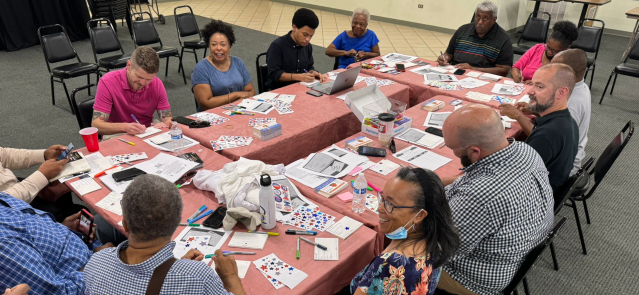Stay ahead of the curve as a political insider with deep policy analysis, daily briefings and policy-shaping tools.
Request a DemoWEEKEND READ: Farmers’ suicides are at their highest, and the state is paying attention
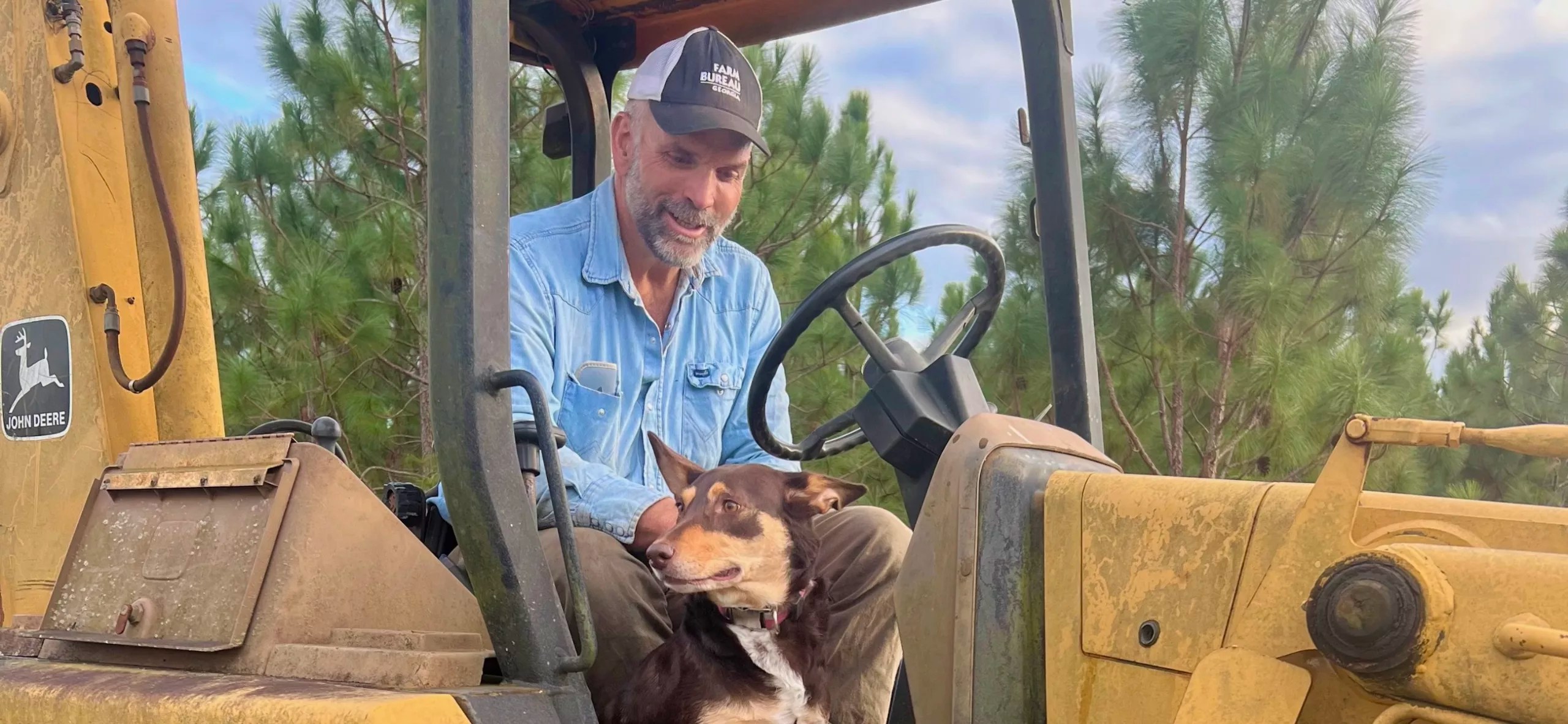
Matt Berry and his dog Lucy on the tractor at his farm. (Credit: Alicia Berry)
Editor’s note: This is the latest in a series of stories looking at the lack of health care in areas of rural Georgia, its impact on residents and how providers and lawmakers are dealing with the issue.
Matt Berry’s workday starts somewhere between 2:30 and 4:30 a.m. most mornings, seven days a week.
It’s what it takes to stay on top of a diversified farming business, which includes 90 head of cattle, along with hay, timber, wheat and oat crops, a custom harvesting operation and trucking company — all run from his 900-acre farm in Sumter County. Then, there’s the unending paperwork, rising fuel, feed and equipment costs and constant equipment repairs. If that weren’t enough, Berry has several hundred thousand dollars in bank loans.
Farmers like Berry also are at the mercy of unpredictable weather, supply and worker shortages, and volatile markets. Last summer’s three-week dry spell, for instance, caused farmers some anxiety.
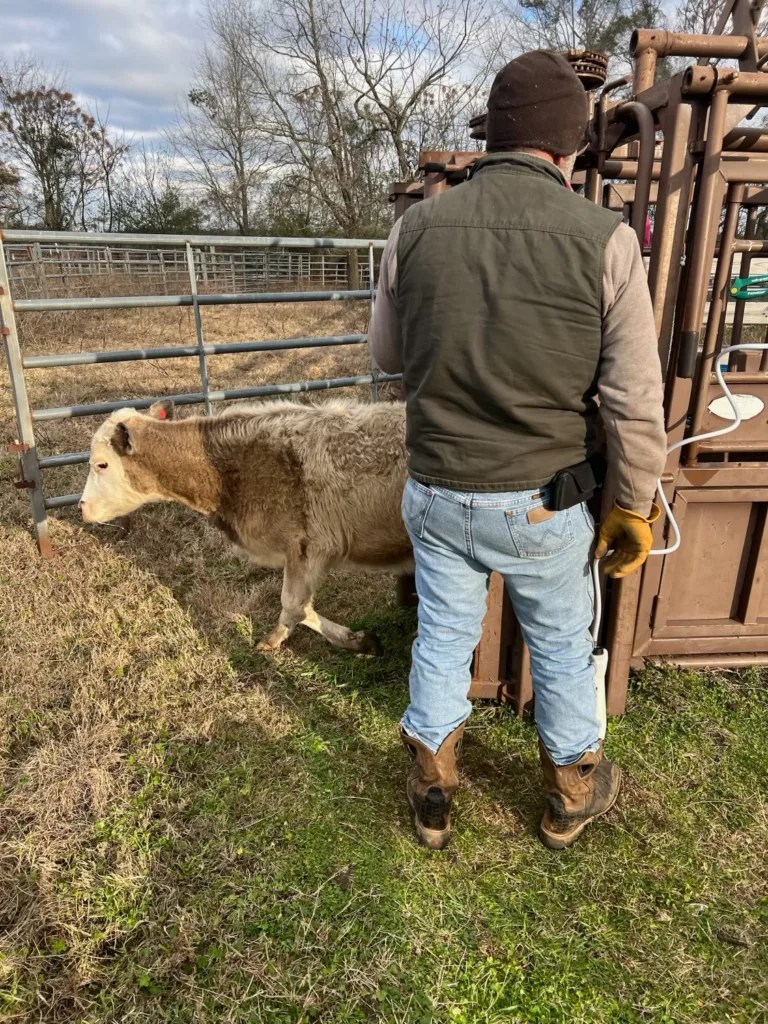
These days, Berry is keeping an eye on the war in Israel and the effects it could have on his operation, and wondering when negotiations on the federal Farm Bill will be resolved.
“I’ve seen about every train wreck you can have: from failed relationships to losing crops due to weather conditions, equipment failure. You know, financing issues,” said Berry, the grandson of a farmer. “We pour our heart and soul into the business and some days you’re the bug. Some days you’re the windshield.”
Modern-day farming has created another disturbing challenge: Farmers are dying by suicide at a higher rate than the general population. Berry knows of at least four farmers in Georgia who’ve died by suicide in the last decade and he admits suicide has “crossed my mind.”
More than 100 farmers and farm workers have died by suicide in Georgia since 2008, according to the Georgia Department of Public Health’s Georgia Violent Death Reporting System. And 42% have considered suicide at least once in the past year, and nearly 3 in 10 farmers have had suicidal thoughts in the past month, according to a 2022 study by the Georgia Rural Health Innovation Center at Mercer University School of Medicine.
That’s a gut punch for a state where the average age of a farmer is 58-years-old and fewer young people are going into the field.
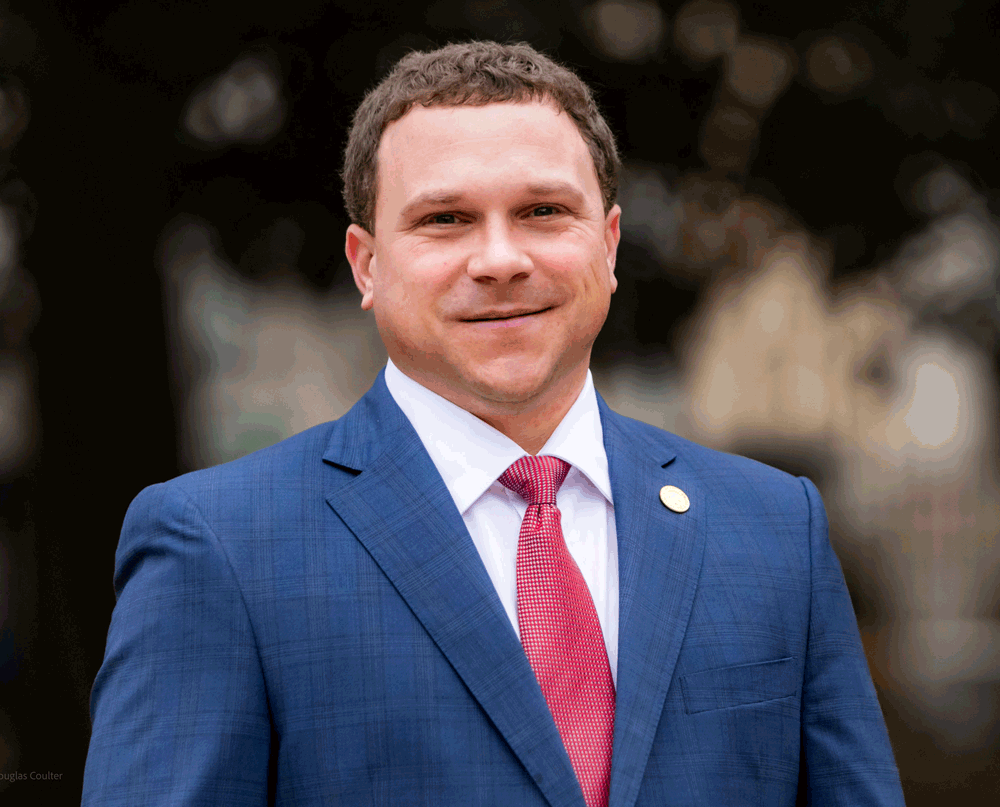
“When you look at those statistics and you combine that with the fact that about 60% of those in rural Georgia, and our farmers specifically, don’t have access to basic medical care — half of them don’t even have health insurance,” Agriculture Commissioner Tyler Harper told State Affairs. ”Those statistics add up to a staggering issue.”
The higher-than-average suicide rate and mental health crisis among farmers has caught the attention of state lawmakers, heads of three state agencies and other key mental health and social work experts who are coming together to address the issue.
Deaths by suicide hit a peak in 2020 in rural Georgia, subsiding slightly since then, according to the Georgia Department of Public Health. Overall, however, the state has seen a 66% increase in rural suicides in the last 20 years, according to Kevin Tanner, commissioner of the Department of Behavioral Health and Developmental Disabilities.
Nationally, farming had the highest rate of death caused by stress-related conditions and psychiatric disorders among 130 U.S. occupations examined by the International Journal of Environmental Research and Public Health. The study also found that farming had the third highest suicide rate.
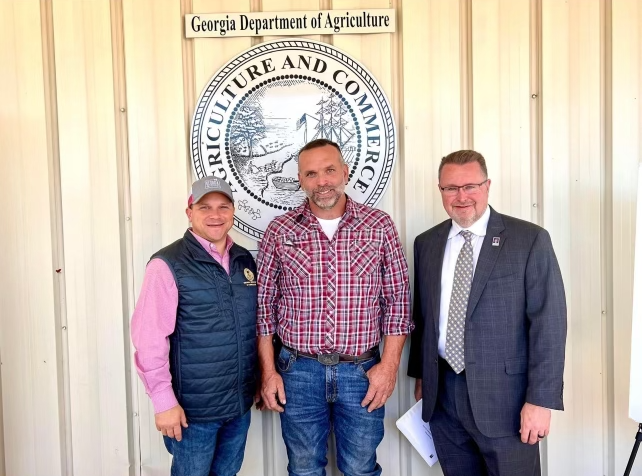
“The truth of the matter is, this is a life and death situation,” Tanner recently told a crowd at the Sunbelt Ag Expo in Moultrie where the first Faith and Farm listening session was held.
The deteriorating mental health of farmers prompted Harper and Tanner, along with Laura Perry-Johnson, associate dean for extension at the University of Georgia, to join forces recently to deal with the crisis. All three come from farming backgrounds.
In the last three years, the three state agencies have invested a combined $5.3 million to address the mental health crisis in rural communities, and in the field of agriculture, where more than 1 in 7 Georgians work. With an annual economic impact of about $74 billion, agriculture is Georgia’s leading industry.
The Department of Behavioral Health and Developmental Disabilities plans to hold listening sessions with farmers across Georgia over the next few months to better understand what they’re experiencing.
‘Hey, man, you got a second?’
At age 49, Berry is the picture of the rough and ready farmer. Few would ever think he has struggled with depression since his mid-20s or has had thoughts of suicide. But he is candid about both.
“If we were honest, as operators, we’ve all been there. I’ll tell you why that’s the case. Let me give you a little snapshot of what our mind does. I’m an operator. I’m in control of everything. I’m at the top of the food chain in my operation. I have my family dependent on me — that consists of my wife, my two sons, and my family legacy on my shoulders since 1928,” said Berry. “I have multi-generations ahead of me. It falls on me. I’m doing everything I can do to keep it alive. And it still goes wrong.
“I work 12, 15, 18, 20 hours a day some days. I can’t make something be something it’s not. You tried everything and you didn’t make a crop because it didn’t rain. Or you put in irrigation like I did one year and you run out of water because it got so dry for so long. But you know your payments are still there. You still have all these things on you that you’ve got to make happen,” said Berry.
He added: “But the reason that [suicide] comes to mind for a lot of us is because of the disappointment we think we’ve given to our children and our peers and our families. Not just our children, but our families. And we never want to disappoint anybody. All of us take a great deal of pride in what we do. But we are at that moment of weakness. We think our families would be better off without us, and that is so far from the truth that it is unbelievable.”
Berry said he didn’t tell his wife Alicia, an oncology nurse, about his struggles until a few years ago because he was embarrassed.
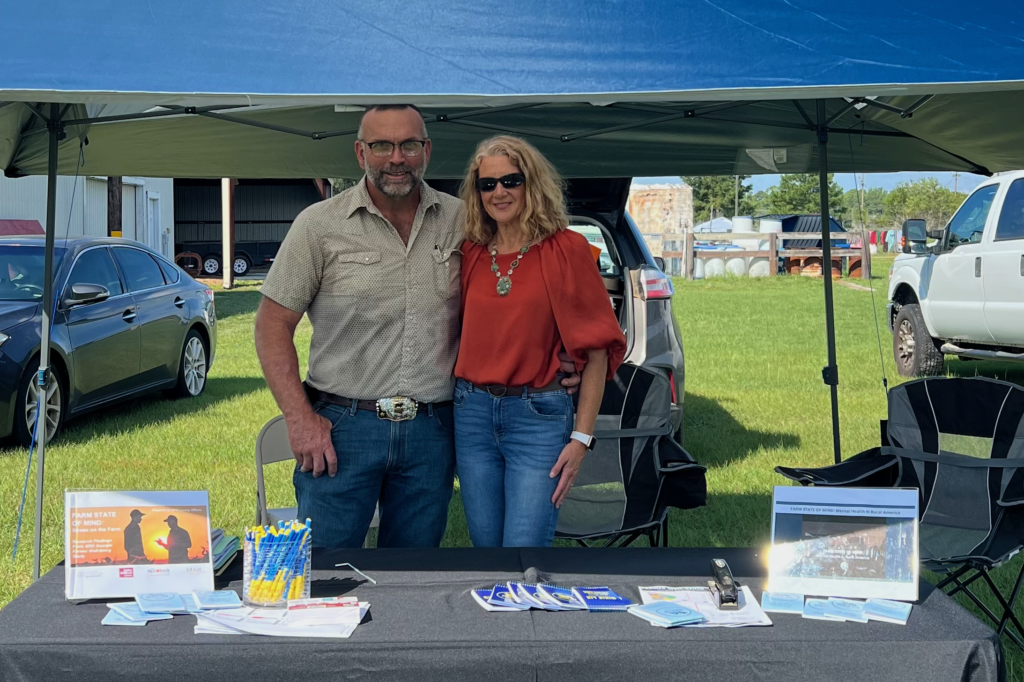
Today, the couple are mental health advocates for farmers. In the last year, he has talked to a few dozen farmers — at restaurants, the gas station, and at events like the recent Sunbelt Ag Expo. The conversation usually starts out, “Hey man, you got a second?”
Debunking the bucolic myth
Berry’s openness about his mental health struggles is rare in an industry and culture that lives by a boot-strap and silence-is-strength code. Consequently, the average Georgian has no clue what it took to get the chicken, cabbage, sweet potatoes and pecan pie that adorned their plates this week.
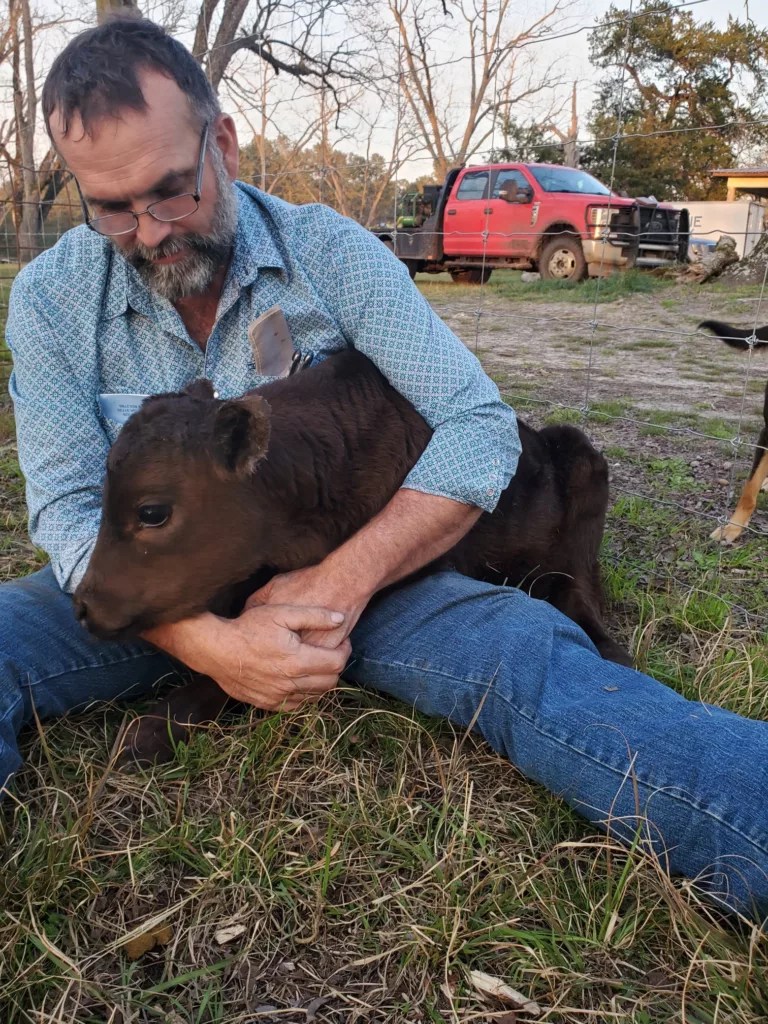
“It’s sort of this bucolic myth: ‘Oh, yeah … cows and being out in nature and what a peaceful life,’ ” UGA professor Anna Scheyett said. “I do not come from a farming background, but the more I learned, the more I realized just what a horrifically stressful life it is.”
The former dean of UGA’s School of Social Work has been studying farmers and stress for over a decade. Despite agriculture’s significant impact on the state’s economy, few studies have been done on the well-being of farmers, Scheyett said.
“Farming is the only occupation I can think of where you have absolutely no control over your success,” she told State Affairs. “You don’t control the weather. You don’t control the input prices. You don’t control the commodity prices that you can sell at. You don’t control whether you can find enough labor. You can do absolutely everything right and make every decision right and put on the right fungicide and still go bankrupt.”
In 2019, Georgia had the second highest number of farm bankruptcies in the country, according to a 2020 Ohio State University report.
Scheyett recalled a time she was talking with a farmer who told her: “’I gotta go to the bank tomorrow. I need to borrow another $1 million because fuel prices have gone up’. Another million dollars. I mean, that makes me sick to my stomach to think that somebody’s having to borrow that much money. But farmers are gamblers.”
Rural life is steeped in self-reliance, Scheyett said. That belief system is beginning to catch up with farmers and rural communities.
Scheyett looked at the 106 suicides among farmers and farmer workers that occurred between 2008 and 2015 (according to the Georgia Violent Death Reporting System) and found that relationship difficulties and health and financial problems were the main cause. Scheyett was the lead author of the study.
Most of the farmers who died by suicide were white men over the age of 50. In a fifth of the cases, victims had made prior suicidal threats; and there was little evidence any victims had sought or received mental health services.
Black farmers represent 4% of farmers in Georgia. Theirs has been a legacy of arguably more hardship and discrimination.
For example, federal Department of Agriculture loans have been a key source for farmers to buy seeds and equipment, supplement their income and expand operations. Yet the loans have not been equally distributed.
“We as Black farmers are accustomed to going through hard times, tough times, feeling like everything’s against us and we’re just making a way. We’re used to that,” said Handy Kennedy Jr., a founder of AgriUnity, a multiracial coalition of 60 farmers and ranchers focused on creating direct farmer- to-consumer markets.
Still, Kennedy was caught off-guard when he learned of one well-known Black farmer who died by suicide earlier this year. “It was surprising that he took that route out,” said Kennedy, a fourth-generation rancher with 250 acres straddling Tattnall and Candler counties.
Living on energy drinks and Bud Light
UGA Rural Health Agent Jennifer Dunn gets calls at least twice a week from overwhelmed farmers. Spouses or partners also routinely call looking for help for their loved ones.
“They might be just at the point of ‘I don’t know what to do’,” she said. “Some are in crisis and some are kind of borderline. I had a farmer tell me recently, I’m not okay. I’m not thinking about suicide, but I’m not OK. We had to get some resources in place for that person. I’m seeing people reaching out a lot more.
“I hear about suicides all the time. I mean, that’s part of my job,” said Dunn, adding that at meetings, she asks farmers about their stress and what they do to relieve it. Then, she tells them about available resources.
“So one of the resources I’m introducing them to is me. I was hired to do this work so that if they’re not comfortable going to the local mental health clinic, I could try to be that bridge for them to get to a therapist.”
She believes the suicide data is “under-reported.”
“Sometimes, there could be a death that may get coded differently.” she said. “Depending on how your insurance or life insurance [is structured]. Life insurance might not pay out if it was suicide, and it might have to be ruled an accidental death or something like it. I’ve heard anecdotally a lot of stories like that.”
The head of a national rural health organization agrees.
“There is a national concern that the situation is much greater than what our data currently indicates,” Alan Morgan, chief executive of the National Rural Health Association told State Affairs. “It is a tough issue to get our hands around.”
Morgan said his organization is “pushing for additional funding in the (federal) farm bill that’s currently stalled in Congress.”
“We think more funding should be included,” Morgan said. And instead of waiting on more behavioral health specialists, states may need to rely more on telehealth, Morgan added.
Overall, addressing mental health and “the magnitude of the problem really necessitates a federal response,” he said.
Reaching out to a cloistered community like farmers is sometimes met with skepticism.
Like the time a farmer asked Scheyett: “Are you a witch? Because unless you’re a witch, and you can control the weather, you can’t do anything about my stress.”
“Which I thought was great. You’re right. I can’t control the weather,” Sheyett recalled. “I can teach you how to do things so that the stress doesn’t kill your body and your mind. We can teach people how to manage stress in ways that are healthy [so that they] aren’t living on energy drinks and Bud Light.”
Scheyett praised state leaders’ efforts to deal with the crisis.“It’s a major step for Georgia. It’s the first time to my knowledge that these three groups have worked this closely together,” she said.
In 2018, Georgia lawmakers gave money to the creation of the Rural Health Innovation Center to deal with the myriad health care challenges in rural communities. Mercer University School of Medicine runs the center on its Macon campus.
No silver bullet
All of Georgia’s 120 rural counties are considered to be Mental Health Professional Shortage areas, according to the Rural Health Information Hub.
Most farmers reported not having access to a psychologist either by telephone, online or in person. Farm managers and farm workers had significantly less access to health care than farm owners. About 6 in 10 farmers don’t have access to basic medical care and more than half of farmers do not have any kind of health care.
“We recognized early on that mental health is a huge issue in Georgia,” Denise Kornegay, executive director of the Statewide Area Health Education Center Network, said. “We pretty much are among the worst in the country. And we know that in rural areas, it’s exacerbated because of the shortage of [health care] providers, as well as the stigma in communities.”
The network is doing what Kornegay called “mental health first aid,” an internationally-recognized training program to help people recognize and de-escalate mental illness and mental disorders. Some 18,000 people have participated in 511 regional programs statewide.
“The idea is to destigmatize mental illness so that people are comfortable talking about it,” Kornegay said. “In Georgia, we have a tremendously motivated Department of Behavioral Health but we have a tremendous shortage of providers, and it’s not getting any better.”
‘I love what I do. It’s biblical’
Given the struggles, why on earth would anyone want to be a farmer?
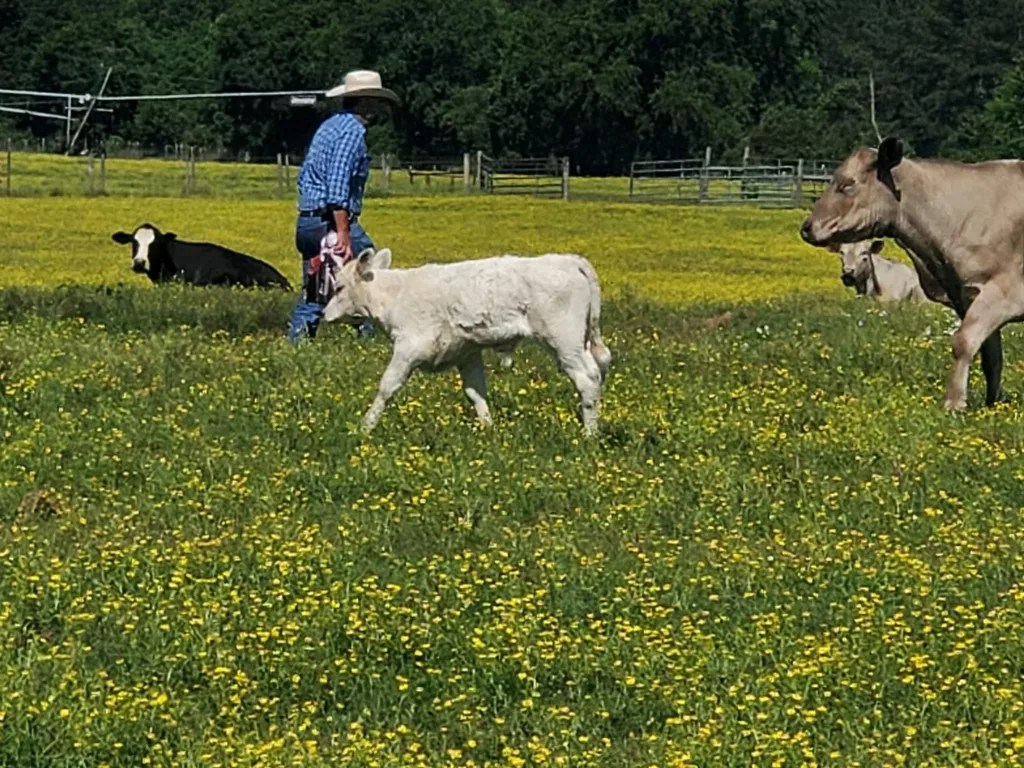
“I love what I do. It’s biblical,” Berry said. “What we do with cattle and what we do with crops. It’s commanded in the Bible. The Bible tells us we’re to be stewards to the earth and the land and animals. Well, we take it seriously. There’s an interaction with me and the cows. I know that sounds crazy. One of the most peaceful places on earth is a cow pasture to me.”
In the meantime, Berry and his wife continue to reach out to farmers in their community and through state farming events.
“When I was little, my daddy and mama were helping other farmers, working with them. It was a community,” said Berry. “We’ve gotten so large we’ve gotten away from that. But I think that one of the biggest constraints in agriculture right now is we’re so individual.
“Getting together as a community of farmers is instrumental in us being able to cope with what’s going on. If it’s just nothing but to sit around and bull jive and joke with somebody about what the field looks like. To the outside public, that seems crude and meaningless but that’s an opportunity to connect,” he said.
FARMER SUICIDE IN GEORGIA : AT A GLANCE
Farmers are under relentless pressure and often suffer in silence. Few seek help and instead struggle with mental health issues or commit suicide. Here’s the demographics of farmers who committed suicide.
- White man
- 50 years old and older
- High school education or less
- Nearly 8 in 10 died by gunshot followed by hanging (16%).
- Relationship (25%) or health problems (25%) were the most common issues, followed by financial problems (12%) and substance use (11%).
- 1 in 5 had made previous suicidal threats
Source: Georgia Violent Death Reporting System, 2008–2015; Anna Scheyett, School of Social Work, University of Georgia.
GEORGIA FARMERS’ MENTAL WELL-BEING
The Georgia Rural Health Innovation Center at Mercer University School of Medicine did an online statewide survey between January and April 2022 . The survey drew 1,651 people in the agriculture industry. It looked at their mental health and well-being. Here’s what the survey found:
- 29% of farmers said they thought of dying by suicide at least once a month.
- 42% of farmers have had suicidal thoughts at least once in the last year.
- 47% said they experienced loneliness at least once a month.
- 49% reported being sad or depressed at least once a month.
- 39% said they felt hopeless at least once a month.
Source: Farmer’s Mental WellBeing Project: Statewide Survey Report, Georgia Rural Health Innovation Center at Mercer University School of Medicine, 2022
Other stories on agriculture and rural health:
Georgia’s new ag commissioner says agriculture is more than ‘cows, sows & plows’
Living behind the eight ball: Rural Georgians fight long health care odds
Monty Veazey discusses raising awareness on rural health care
Georgia Chamber report: rural Georgia vital to state’s economic future
What will happen with the Certificate of Need law? Ask 10 people, get 8 different answers
Can David and Goliath co-exist? Georgia Senate mulls options to create more medical centers
Kevin Tanner talks improving mental health access in Georgia
If you or someone you know is in crisis, please call the 988 Suicide and Crisis Lifeline, which has trained listeners standing by and ready to help. Visit 988lifeline.org for crisis chat services or for more information.
Have questions, comments or tips? Contact Tammy Joyner on X @lvjoyner or at [email protected].
X @StateAffairsGA
Instagram@StateAffairsGA
Facebook @StateAffairsGA
LinkedIn @StateAffairs
Header image: Matt Berry and his dog Lucy on the tractor. (Credit: Alicia Berry)
Sign here! Democrats launch largest voter registration drive to boost Kamala Harris
CHICAGO — As the Democratic National Convention reaches its midpoint, party architects and advocacy groups across the country are implementing an aggressive voter registration push that’s not only supposed to help Vice President Kamala Harris win the White House through increased turnout, but also create a mandate for the future expansion of voting rights. Those …
The DNC according to James Carville
Approaching age 80, James Carville — the Democratic Party’s own Ragin’ Cajun — is preparing for the release of a documentary about his life’s work, reflecting on his decision to ask President Joe Biden to step down and embracing an age where he can “say anything I want.” CHICAGO (Aug. 19, 2024) — Here comes …
New election rule gives officials time to probe, delay ballot counts before certifying results
County election officials now have greater scrutiny to investigate and delay ballot counts before certifying election results. The Republican-controlled State Election Board passed a rule Monday granting the additional authority to county election boards. The 3-2 vote enables local election officials to do a hand recount of votes to make sure the number of ballots …
Race bias case advances on First Amendment merit
A federal judge’s recent decision to allow parts of a civil rights lawsuit involving Black high school students in northwest Georgia to go to trial over their right to wear Black Lives Matter shirts is a warning to school administrators nationwide, the students’ attorney said on Monday. “The case we have is pretty big. It’s …

